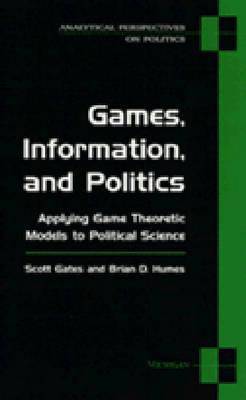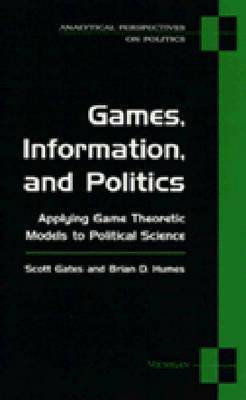
- Retrait gratuit dans votre magasin Club
- 7.000.000 titres dans notre catalogue
- Payer en toute sécurité
- Toujours un magasin près de chez vous
- Retrait gratuit dans votre magasin Club
- 7.000.000 titres dans notre catalogue
- Payer en toute sécurité
- Toujours un magasin près de chez vous
Games, Information, and Politics
Applying Game Theoretic Models to Political Science
Scott Gates, Brian D Humes
33,45 €
+ 66 points
Description
To study the strategic interaction of individuals, we can use game theory. Despite the long history shared by game theory and political science, many political scientists remain unaware of the exciting game theoretic techniques that have been developed over the years. As a result they use overly simple games to illustrate complex processes. Games, Information, and Politics is written for political scientists who have an interest in game theory but really do not understand how it can be used to improve our understanding of politics. To address this problem, Gates and Humes write for scholars who have little or no training in formal theory and demonstrate how game theoretic analysis can be applied to politics. They apply game theoretic models to three subfields of political science: American politics, comparative politics, and international relations. They demonstrate how game theory can be applied to each of these subfields by drawing from three distinct pieces of research. By drawing on examples from current research projects the authors use real research problems--not hypothetical questions--to develop their discussion of various techniques and to demonstrate how to apply game theoretic models to help answer important political questions. Emphasizing the process of applying game theory, Gates and Humes clear up some common misperceptions about game theory and show how it can be used to improve our understanding of politics.
Games, Information, and Politics is written for scholars interested in understanding how game theory is used to model strategic interactions. It will appeal to sociologists and economists as well as political scientists.
Scott Gates is Assistant Professor of Political Science, Michigan State University. Brian D. Humes is Associate Professor of Political Science, University of Nebraska-Lincoln.
Games, Information, and Politics is written for scholars interested in understanding how game theory is used to model strategic interactions. It will appeal to sociologists and economists as well as political scientists.
Scott Gates is Assistant Professor of Political Science, Michigan State University. Brian D. Humes is Associate Professor of Political Science, University of Nebraska-Lincoln.
Spécifications
Parties prenantes
- Auteur(s) :
- Editeur:
Contenu
- Nombre de pages :
- 192
- Langue:
- Anglais
- Collection :
Caractéristiques
- EAN:
- 9780472065646
- Date de parution :
- 07-02-97
- Format:
- Livre broché
- Format numérique:
- Trade paperback (VS)
- Dimensions :
- 140 mm x 233 mm
- Poids :
- 272 g







